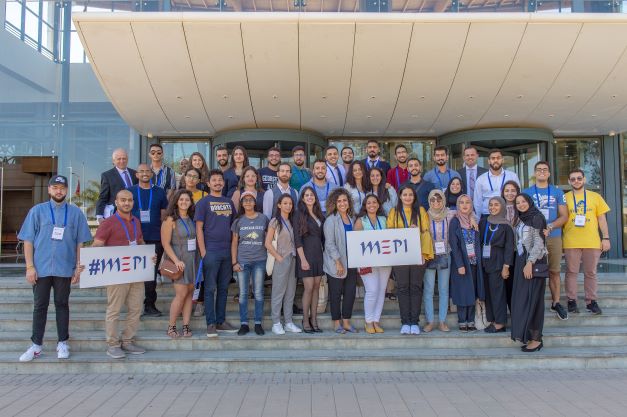Three ways to support alumni in getting the most of their alumni networks

In cooperation with the U.S.-Middle East Partnership Initiative (MEPI), IREX launched the MEPI Alumni Connection in 2017 to develop an active alumni network that fosters long-lasting relationships and opportunities to stimulate social and business entrepreneurship across the Middle East and North Africa (MENA). The endline evaluation of the program highlighted the importance of incorporating alumni perspectives in evaluating the success of alumni networks.
From 2017 to 2022, the MEPI Alumni Connection supported hundreds of alumni across the Middle East and North Africa to build their professional capacities and implement programs that have benefitted thousands of individuals in their communities. In 2022, the program conducted an endline evaluation of the program that relied on mixed-method data collection tools. The evaluation included a survey (to which 204 alumni responded), focus group discussions, key informant interviews, and the collection of stories of Most Significant Change (MSC). Evaluation findings revealed important ways that professional development opportunities can be designed to appeal to a maximum number of alumni; highlighted viable opportunities to prepare alumni to sustainably scale their community projects by attracting larger donor funding.
Here are three things the evaluation taught us about how to improve alumni networks:
1) Diversify professional development opportunities
We learned that while the opportunities IREX offered resonated with alumni, many did not take part in the network’s professional development opportunities because they felt these opportunities were not advanced enough to meet their needs at various stages in their careers. This finding underscored the importance of regularly monitoring professional development to ensure opportunities keep pace with alumni’s ever-evolving needs.
To facilitate a greater understanding of why some alumni did not participate in program activities and how the network could be improved to appeal to more members, IREX interviewed ‘inactive’ alumni who had not taken part in a program activity since 2020. Their responses revealed that the largest share of alumni in the network are in their twenties and were already working in mid or executive level roles, and the training provided was insufficient to meet their needs. The alumni required intermediate-level training and professional development to support their pursuit of advanced roles and responsibilities.
Some inactive alumni also pointed out that they were not interested in the nature of the professional development offered because it did not pertain to their professions. Since 68% of alumni are employed by international or national non-governmental organizations (NGOs), many opportunities intentionally, but not exclusively, related to those who worked in the non-profit sector. While this appealed to many alumni, it was potentially disengaging for alumni who worked in other fields, especially the sciences.
Though a utilitarian approach to the design of program activities for large alumni networks is useful, it is important for those operating alumni networks to consider curating opportunities that appeal to various stages of development and career interests. Doing so will better ensure that activities appeal to a broad range of alumni and that alumni find utility in the network and take part in activities.
2) Build alumni capacity for fundraising
The value of small grant opportunities for alumni cannot be overstated. Throughout the program, IREX distributed funds to alumni which supported them to improve their communities. With the grants, alumni promoted spaces for civic engagement; enhanced media literacy; fostered youth employment and entrepreneurship; combated environmental degradation; and provided the tools and resources necessary for countless women and girls to empower themselves.
Through IREX’s monitoring of these projects, we know that small grants provide an invaluable opportunity for alumni to invest in and improve their communities. Small grants constitute an excellent professional development opportunity, enabling alumni to operationalize the knowledge they gain through training.
As alumni look to scale their programs, they require additional funding from various sources. Programs managing alumni networks can make an explicit effort to prepare alumni to receive and manage large donor funds. They can do this by training and requiring alumni to create and update workplans and budgets; file cost and no-cost extensions; develop and execute monitoring evaluation and learning plans; prepare donor reports and impactful communications materials, such as success stories. Providing detailed feedback throughout this process will prepare alumni for the stringent requirements of large donors and support alumni in successfully seeking and obtaining funding from third parties, enhancing the sustainability and impact of their programs.
3) Allow alumni to determine program success
In the evaluation, IREX asked alumni how they would determine that the program was “a success.” One alum suggested that IREX should measure the impact of alumni’s work in their communities and the extent to which alumni have gained new skills and experiences. Nearly every activity of the MEPI Alumni Connection was in some way informed by the needs and interests of alumni - from the planning of two large alumni summits to the times of day for networking opportunities and more.
These recommendations remind us why it is important to incorporate alumni into the design of monitoring, evaluation, and learning (MEL) plans as early, consistently, and thoroughly as possible. While developing MEL plans is challenging when constantly negotiating the (sometimes competing) priorities of donors, implementing partners, and program participants, it is important for anyone administering these networks to remember the most important stakeholder: the alumni. Their beliefs about what makes a program (which is intended to benefit them) a success should be predominate and can be used to create indicators to determine success more appropriately.
Alumni input should be captured as early as possible in the design of the program, and recaptured regularly throughout program implementation, using methods such as assessments, alumni committees, focus group discussions, or town hall meetings. This will continuously place alumni at the center of the program’s design and implementation and, by extension, better ensure the delivery of programs that foster prosperity in the lives of alumni and their communities.
You can access the full evaluation report here.